冀教版八年级下册Unit 5 Buying and Selling Lesson 27 Business English课件(共35张PPT)
文档属性
| 名称 | 冀教版八年级下册Unit 5 Buying and Selling Lesson 27 Business English课件(共35张PPT) |

|
|
| 格式 | pptx | ||
| 文件大小 | 434.7KB | ||
| 资源类型 | 教案 | ||
| 版本资源 | 冀教版 | ||
| 科目 | 英语 | ||
| 更新时间 | 2024-05-02 18:08:43 | ||
图片预览

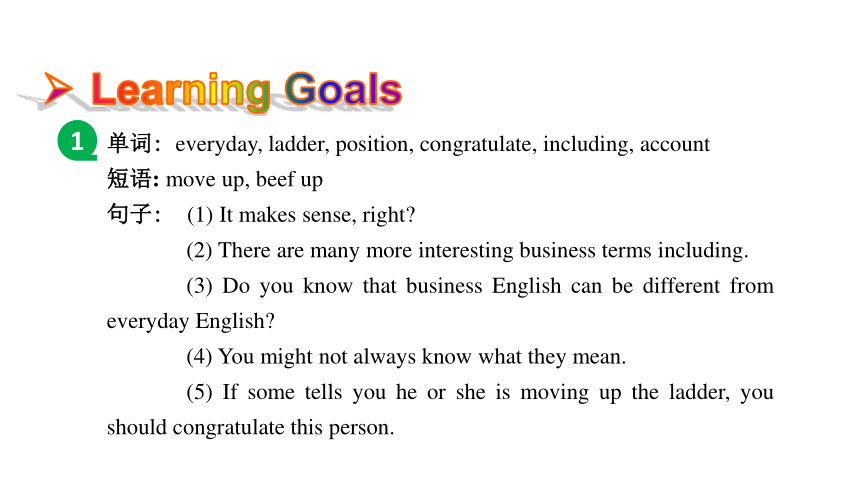
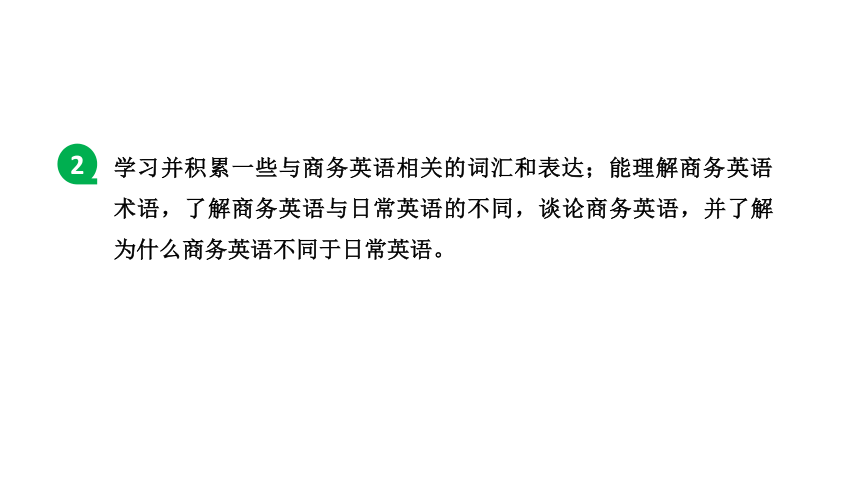
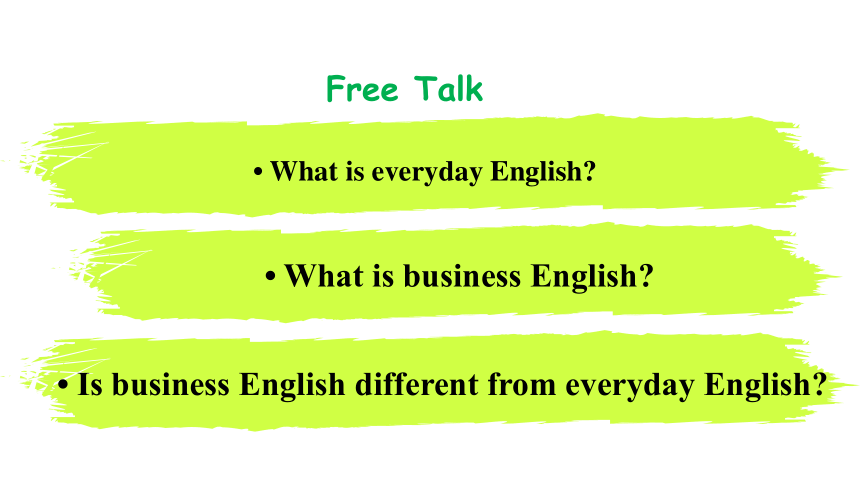
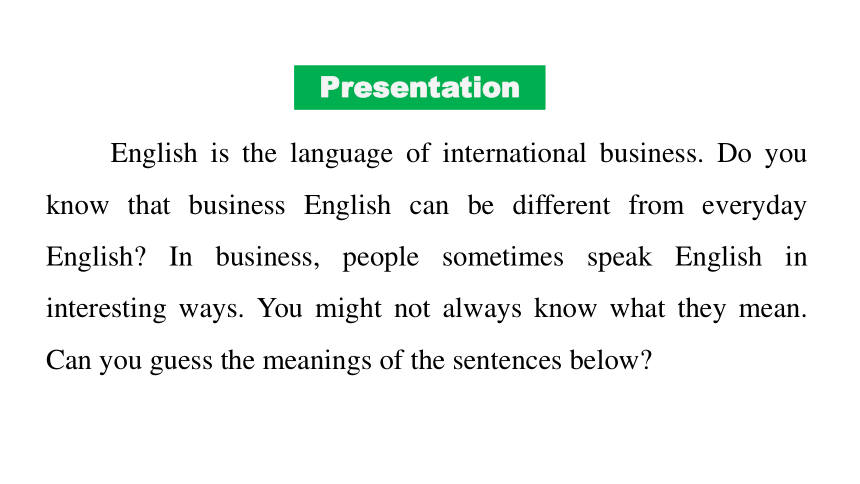
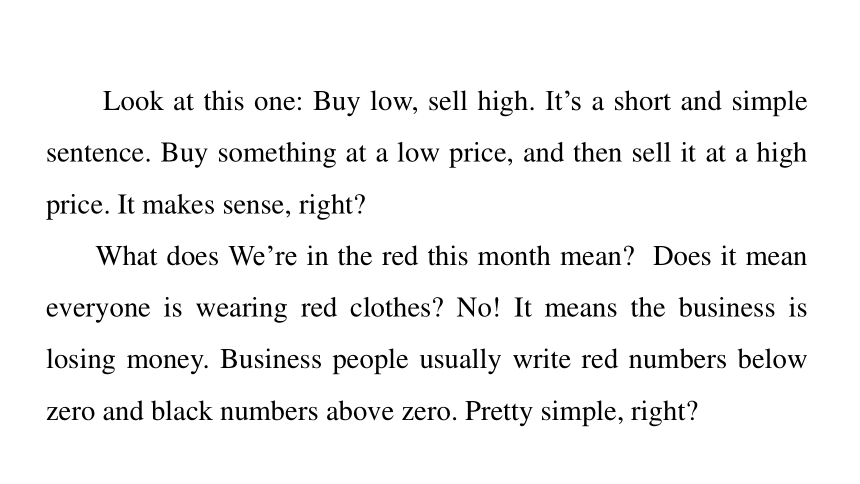
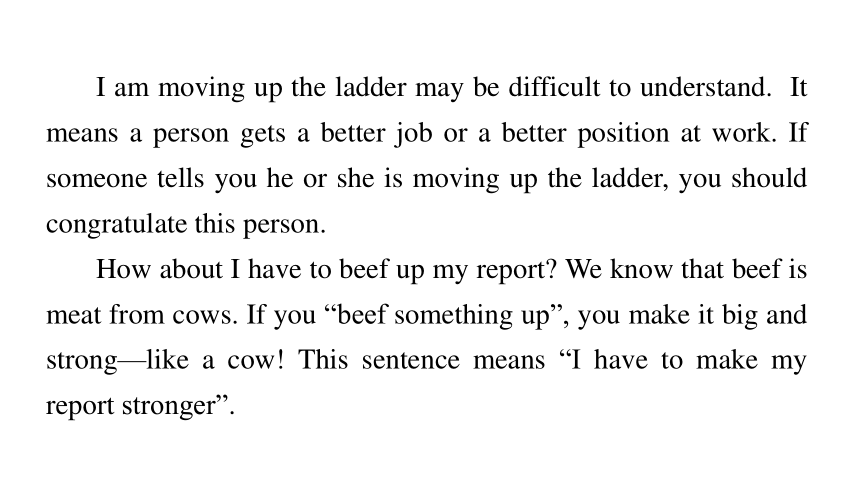
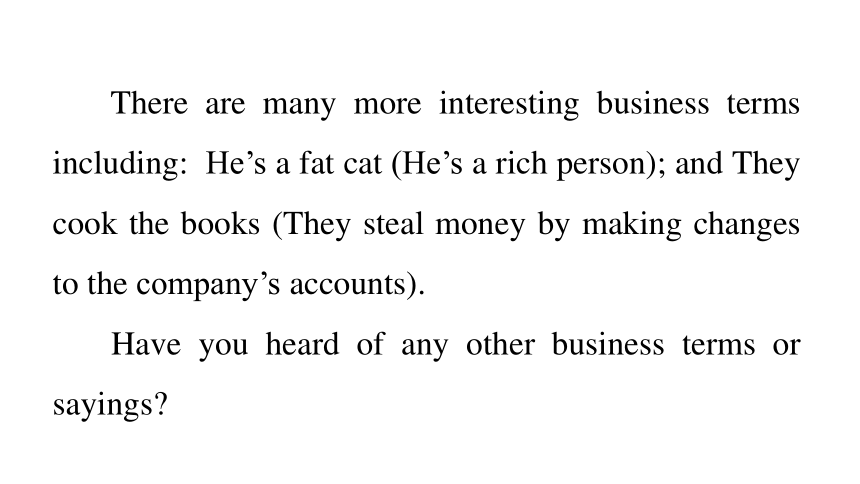
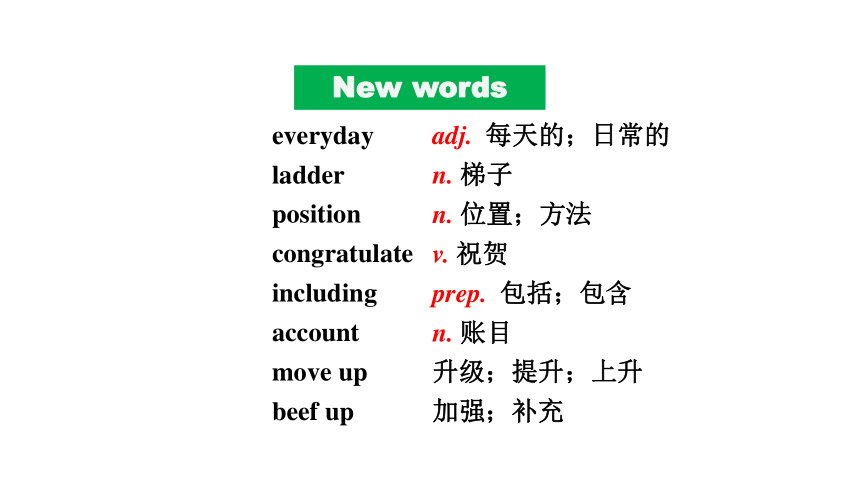
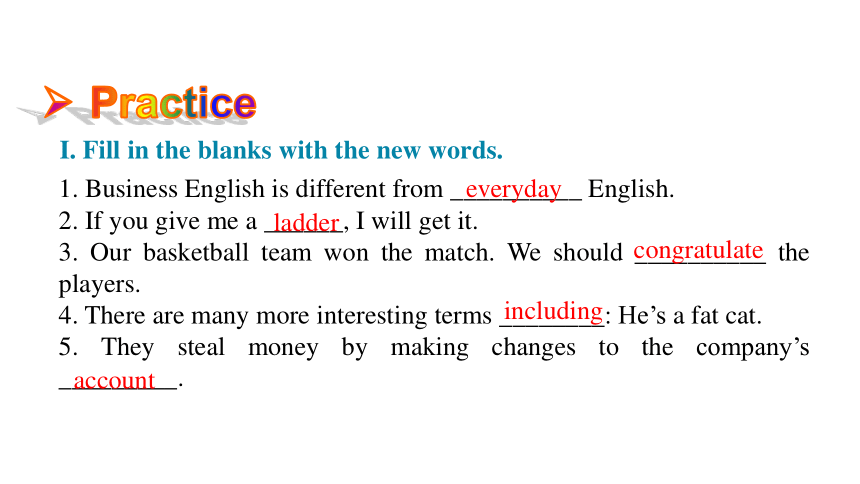
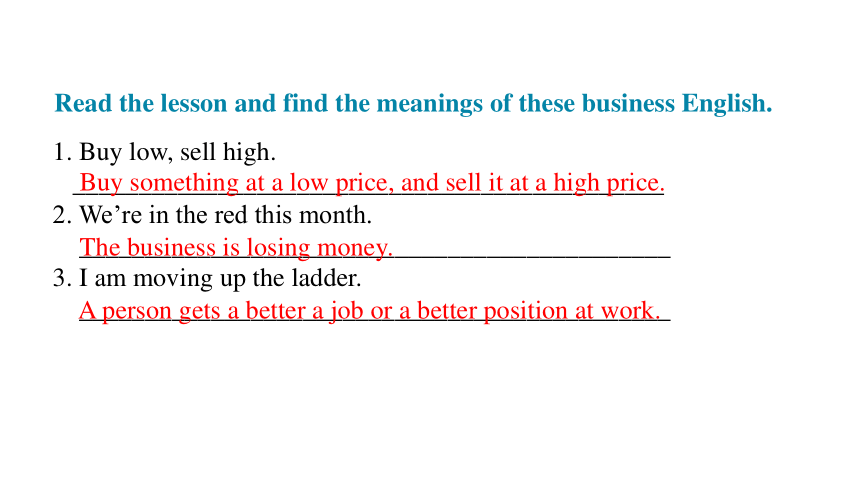
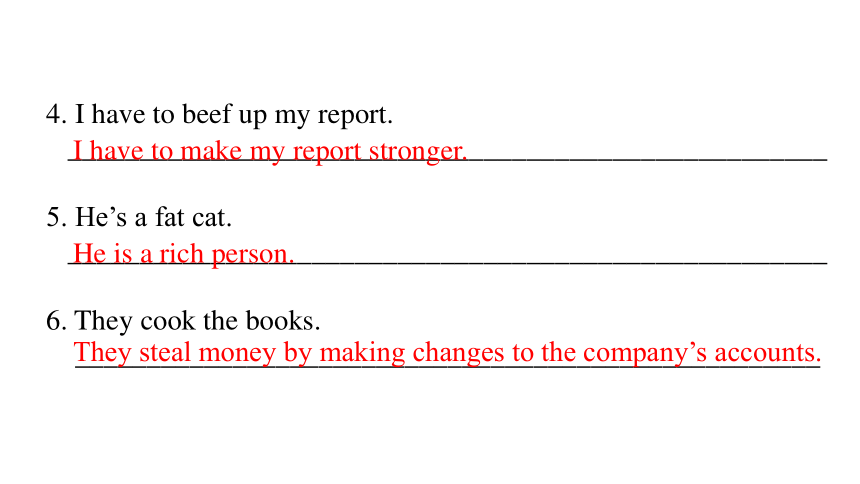
文档简介
(共35张PPT)
Lesson 27: Business English
Unit 5 Buying and Selling
单词: everyday, ladder, position, congratulate, including, account
短语: move up, beef up
句子: (1) It makes sense, right
(2) There are many more interesting business terms including.
(3) Do you know that business English can be different from everyday English
(4) You might not always know what they mean.
(5) If some tells you he or she is moving up the ladder, you should congratulate this person.
Learning Goals
1
学习并积累一些与商务英语相关的词汇和表达;能理解商务英语术语,了解商务英语与日常英语的不同,谈论商务英语,并了解为什么商务英语不同于日常英语。
2
Free Talk
What is everyday English
What is business English
Is business English different from everyday English
Presentation
English is the language of international business. Do you know that business English can be different from everyday English In business, people sometimes speak English in interesting ways. You might not always know what they mean. Can you guess the meanings of the sentences below
Look at this one: Buy low, sell high. It’s a short and simple sentence. Buy something at a low price, and then sell it at a high price. It makes sense, right
What does We’re in the red this month mean Does it mean everyone is wearing red clothes No! It means the business is losing money. Business people usually write red numbers below zero and black numbers above zero. Pretty simple, right
I am moving up the ladder may be difficult to understand. It means a person gets a better job or a better position at work. If someone tells you he or she is moving up the ladder, you should congratulate this person.
How about I have to beef up my report We know that beef is meat from cows. If you “beef something up”, you make it big and strong—like a cow! This sentence means “I have to make my report stronger”.
There are many more interesting business terms including: He’s a fat cat (He’s a rich person); and They cook the books (They steal money by making changes to the company’s accounts).
Have you heard of any other business terms or sayings
New words
everyday
ladder
position
congratulate
including
account
move up beef up
adj. 每天的;日常的
n. 梯子
n. 位置;方法
v. 祝贺
prep. 包括;包含
n. 账目
升级;提升;上升
加强;补充
Practice
1. Business English is different from __________ English.
2. If you give me a ______, I will get it.
3. Our basketball team won the match. We should __________ the players.
4. There are many more interesting terms ________: He’s a fat cat.
5. They steal money by making changes to the company’s _________.
everyday
congratulate
ladder
including
account
I. Fill in the blanks with the new words.
Read the lesson and find the meanings of these business English.
1. Buy low, sell high.
_____________________________________________
2. We’re in the red this month.
_____________________________________________
3. I am moving up the ladder.
_____________________________________________
Buy something at a low price, and sell it at a high price.
The business is losing money.
A person gets a better a job or a better position at work.
4. I have to beef up my report.
_____________________________________________________
5. He’s a fat cat.
_____________________________________________________
6. They cook the books.
____________________________________________________
I have to make my report stronger.
They steal money by making changes to the company’s accounts.
He is a rich person.
Let’s do it!
2. Listen to the passage and write true (T) or false (F) .
1. If people learn English ,they can have more success in business.( )
2. Business English is very easy to understand.( )
3. “Don’t be a yes-man” means “Don’t always say ‘yes’ without thinking”.( )
4. “I’ve made it” means “I have succeeded in business”. ( )
T
F
T
T
1.与……不同____________ 2.日常英语 _____________
3. ……的含义____________ 4.以低价________________
5.以高价 ______________ 6.有道理;有意义________
7.升级;提升 ___________ 8.加强;补充 ____________
9.听说_________
be different from
make sense
beef up
move up
hear of
at a low price
everyday English
the meaning of
at a high price
Read the lesson and find the phrases.
Reading and Finding
1. In business, how do people sometimes speak English?
2. When the number is above zero, what numbers do people usually write
3. What animal is big and strong in the lesson
Read the passage again and answer the questions.
They speak English in interesting ways.
They write black numbers.
A cow.
Reading and Answering
3. Fill in the blanks with the correct prepositions.
1. —Who’s the woman ______red?
—Oh, she’s my English teacher, May!
2. My kite is in the tree. I must climb ______the ladder and get it.
3. If you work hard _____ your job, you will succeed.
4. They learn English _____watching TV programs.
5. Saying “yes” _______ thinking makes you a yes-man.
6. I don’t understand. Can you explain it to me ______ another way?
in
up
in
by
at
without
Let’s do it!
4. Search the Internet and find more examples of business language. There are also many business terms and sayings in Chinese. Can you make a list of them
How long have you been in the biz
What a fly by-night operation!
Can you come down a little
It would turn out to be a real cash cow.
Let’s do it!
Language points
1. Do you know that business English can be different from everyday English
be different from与……不同,其反义短语为:the same as 和……一样。
※ The weather here is different from that in Jinan.
这儿的天气不同于济南。
everyday adj. 每天的;日常的
辨析: everyday和every day
everyday日常的; 每天的; 形容词, 后面可以直接跟名词, 只作定语。 The everyday English should be
learnt by heart. 应熟记日常英语。
every day每天; 天天; 副词词组, 作状语, 通常位于句首或句末, 用来修饰整个句子。 I go to school every day.
我每天上学。
2. Is business English different from everyday English 商务英语和日常英语有区别吗
(1) everyday adj. 日常的,每天的。相当于daily,常在句中作定语修饰名词。
every day 每天,表示频率。
※ I have a lot of everyday work to do.
我有许多日常工作要做。
※ He goes to school by bike every day.
他每天骑自行车去上学。
(2) be different from 与……不同。反义短语be the same as... 意为“与……相同,同……一样”。
※ My book is different from his.
我的书和他的不一样。
拓展:different的名词形式difference意为“差异,差别”,是可数名词。
※ There are five differences in the picture. Can you see them
这幅画中有五处不同。你能看得出来吗
3. You might not always know what they mean.
(1) might可能
might是情态动词,在此处表示不太肯定的推测。其可能性比may小,语气也更委婉。
※ You might feel sleepy after taking the medicine.
吃药后,你可能会觉得困。
※ He might come, but I am not quite sure.
他可能来,但我不太确定。
拓展:may和might还可以表示提出请求或征求许可,might的语气更加委婉。
※ He asked if he might go home.
他问是否他可以回家。
(2) mean v. 意思是
mean作动词,意为“意思是”,不用于进行时,后面可以跟名词或that引导的宾语从句(that可省略)。
mean还可表示“打算;意欲;意味着”常用结构:
mean to do sth.打算做某事
mean doing sth.意味着做某事
※ What does the phrase mean
这个短语是什么意思
※ I mean to go with you.
我打算和你一起去。
※ This new rule will mean working overtime.
这个新规定意味着加班。
4. Buy something at a low price, and then sell it at a high price.低价买入某物,然后高价把它卖出去。
at a low / high price 以低价/高价。
price常与介词at连用,表示“以……的价格”。
※ I bought this house at a price of 1, 000, 000 yuan.
我以100万元的价格买下了这个房子。
5. What does “We’re in the red this month” mean
be in the red 负债;亏空。反义短语:be in the black 有盈余
※ Was your company in the black or in the red last year
你们公司去年盈利还是亏损
拓展:in red意为“用红笔/红颜色”或“穿着红衣服”。
※ Do you know the girl in red
你认识那个穿红衣服的女孩吗
※ Please mark the sentence in red.
请用红笔在这个句子旁做记号。
6. It makes sense, right
make sense 讲得通,言之有理
make good sense 很有道理
make no sense 讲不通;没道理
※ It all started to make sense.
这一切都开始变得有意义。
※ This sentence doesn’t make sense.
这个句子不通。
7. I am moving up the ladder may be difficult to understand.
move up 升级;提升;上升
move up是动副型短语,若宾语为代词,必须放在move和up之间。
※ This picture is too low. Please move it up.
这张图画(位置)太低了。请把它往上移。
※ His boss will move him up soon.
他的老板很快就会提拔他。
8. ...you should congratulate this person.
congratulate v. 祝贺
congratulate sb. 祝贺某人
congratulate sb. on sth. 因某事而祝贺某人
※ Let’s congratulate your teacher.
让我们祝贺你的老师吧。
※ We congratulated him on his success.
我们祝贺他取得了成功。
9. There are many more interesting business terms including… 有许多更有趣的商务术语,包括……
including prep. 包括……在内。和其后的名词/代词一起形成介宾短语。
※ There are many different kinds of things to eat, including fruit, chocolate and nuts.
有许多不同种类的可食用的东西,包括水果、巧克力和坚果。
拓展:
①included adj. 包括在内的。仅用在名词之后,即:including +名词=名词+ included。
※ There are 40 students in the classroom, including me.
= There are 40 students in the classroom, me included.
教室里包括我在内,有四十名学生。
②include v. 包含,包括
※ The price for the hotel includes breakfast.
旅馆的价格包括早餐。
1. He is ____________ in the company very quickly.
2. They need some new players to _________ their basketball team.
3. The two languages __________________ each other in many
ways.
4. They have never _____________ such an interesting thing.
5. I don’t think it ______________. So I don’t agree with you.
moving up
beef up
are different from
heard of
makes sense
hear of, beef up, move up, make sense, be different from
Practice
用方框内所给词语的适当形式填空。
Sum up
1. The new words:
everyday, ladder, position, congratulate, including, account
2. Important phrases:
move up, beef up
3. Important sentences:
It makes sense, right
(2) There are many more interesting business terms including.
(3) Do you know that business English can be different from everyday English
(4) You might not always know what they mean.
(5) If some tells you he or she is moving up the ladder, you should congratulate this person.
Homework
1. Remember the new words and expressions learnt in this lesson.
2. Preview Lesson 28.
Lesson 27: Business English
Unit 5 Buying and Selling
单词: everyday, ladder, position, congratulate, including, account
短语: move up, beef up
句子: (1) It makes sense, right
(2) There are many more interesting business terms including.
(3) Do you know that business English can be different from everyday English
(4) You might not always know what they mean.
(5) If some tells you he or she is moving up the ladder, you should congratulate this person.
Learning Goals
1
学习并积累一些与商务英语相关的词汇和表达;能理解商务英语术语,了解商务英语与日常英语的不同,谈论商务英语,并了解为什么商务英语不同于日常英语。
2
Free Talk
What is everyday English
What is business English
Is business English different from everyday English
Presentation
English is the language of international business. Do you know that business English can be different from everyday English In business, people sometimes speak English in interesting ways. You might not always know what they mean. Can you guess the meanings of the sentences below
Look at this one: Buy low, sell high. It’s a short and simple sentence. Buy something at a low price, and then sell it at a high price. It makes sense, right
What does We’re in the red this month mean Does it mean everyone is wearing red clothes No! It means the business is losing money. Business people usually write red numbers below zero and black numbers above zero. Pretty simple, right
I am moving up the ladder may be difficult to understand. It means a person gets a better job or a better position at work. If someone tells you he or she is moving up the ladder, you should congratulate this person.
How about I have to beef up my report We know that beef is meat from cows. If you “beef something up”, you make it big and strong—like a cow! This sentence means “I have to make my report stronger”.
There are many more interesting business terms including: He’s a fat cat (He’s a rich person); and They cook the books (They steal money by making changes to the company’s accounts).
Have you heard of any other business terms or sayings
New words
everyday
ladder
position
congratulate
including
account
move up beef up
adj. 每天的;日常的
n. 梯子
n. 位置;方法
v. 祝贺
prep. 包括;包含
n. 账目
升级;提升;上升
加强;补充
Practice
1. Business English is different from __________ English.
2. If you give me a ______, I will get it.
3. Our basketball team won the match. We should __________ the players.
4. There are many more interesting terms ________: He’s a fat cat.
5. They steal money by making changes to the company’s _________.
everyday
congratulate
ladder
including
account
I. Fill in the blanks with the new words.
Read the lesson and find the meanings of these business English.
1. Buy low, sell high.
_____________________________________________
2. We’re in the red this month.
_____________________________________________
3. I am moving up the ladder.
_____________________________________________
Buy something at a low price, and sell it at a high price.
The business is losing money.
A person gets a better a job or a better position at work.
4. I have to beef up my report.
_____________________________________________________
5. He’s a fat cat.
_____________________________________________________
6. They cook the books.
____________________________________________________
I have to make my report stronger.
They steal money by making changes to the company’s accounts.
He is a rich person.
Let’s do it!
2. Listen to the passage and write true (T) or false (F) .
1. If people learn English ,they can have more success in business.( )
2. Business English is very easy to understand.( )
3. “Don’t be a yes-man” means “Don’t always say ‘yes’ without thinking”.( )
4. “I’ve made it” means “I have succeeded in business”. ( )
T
F
T
T
1.与……不同____________ 2.日常英语 _____________
3. ……的含义____________ 4.以低价________________
5.以高价 ______________ 6.有道理;有意义________
7.升级;提升 ___________ 8.加强;补充 ____________
9.听说_________
be different from
make sense
beef up
move up
hear of
at a low price
everyday English
the meaning of
at a high price
Read the lesson and find the phrases.
Reading and Finding
1. In business, how do people sometimes speak English?
2. When the number is above zero, what numbers do people usually write
3. What animal is big and strong in the lesson
Read the passage again and answer the questions.
They speak English in interesting ways.
They write black numbers.
A cow.
Reading and Answering
3. Fill in the blanks with the correct prepositions.
1. —Who’s the woman ______red?
—Oh, she’s my English teacher, May!
2. My kite is in the tree. I must climb ______the ladder and get it.
3. If you work hard _____ your job, you will succeed.
4. They learn English _____watching TV programs.
5. Saying “yes” _______ thinking makes you a yes-man.
6. I don’t understand. Can you explain it to me ______ another way?
in
up
in
by
at
without
Let’s do it!
4. Search the Internet and find more examples of business language. There are also many business terms and sayings in Chinese. Can you make a list of them
How long have you been in the biz
What a fly by-night operation!
Can you come down a little
It would turn out to be a real cash cow.
Let’s do it!
Language points
1. Do you know that business English can be different from everyday English
be different from与……不同,其反义短语为:the same as 和……一样。
※ The weather here is different from that in Jinan.
这儿的天气不同于济南。
everyday adj. 每天的;日常的
辨析: everyday和every day
everyday日常的; 每天的; 形容词, 后面可以直接跟名词, 只作定语。 The everyday English should be
learnt by heart. 应熟记日常英语。
every day每天; 天天; 副词词组, 作状语, 通常位于句首或句末, 用来修饰整个句子。 I go to school every day.
我每天上学。
2. Is business English different from everyday English 商务英语和日常英语有区别吗
(1) everyday adj. 日常的,每天的。相当于daily,常在句中作定语修饰名词。
every day 每天,表示频率。
※ I have a lot of everyday work to do.
我有许多日常工作要做。
※ He goes to school by bike every day.
他每天骑自行车去上学。
(2) be different from 与……不同。反义短语be the same as... 意为“与……相同,同……一样”。
※ My book is different from his.
我的书和他的不一样。
拓展:different的名词形式difference意为“差异,差别”,是可数名词。
※ There are five differences in the picture. Can you see them
这幅画中有五处不同。你能看得出来吗
3. You might not always know what they mean.
(1) might可能
might是情态动词,在此处表示不太肯定的推测。其可能性比may小,语气也更委婉。
※ You might feel sleepy after taking the medicine.
吃药后,你可能会觉得困。
※ He might come, but I am not quite sure.
他可能来,但我不太确定。
拓展:may和might还可以表示提出请求或征求许可,might的语气更加委婉。
※ He asked if he might go home.
他问是否他可以回家。
(2) mean v. 意思是
mean作动词,意为“意思是”,不用于进行时,后面可以跟名词或that引导的宾语从句(that可省略)。
mean还可表示“打算;意欲;意味着”常用结构:
mean to do sth.打算做某事
mean doing sth.意味着做某事
※ What does the phrase mean
这个短语是什么意思
※ I mean to go with you.
我打算和你一起去。
※ This new rule will mean working overtime.
这个新规定意味着加班。
4. Buy something at a low price, and then sell it at a high price.低价买入某物,然后高价把它卖出去。
at a low / high price 以低价/高价。
price常与介词at连用,表示“以……的价格”。
※ I bought this house at a price of 1, 000, 000 yuan.
我以100万元的价格买下了这个房子。
5. What does “We’re in the red this month” mean
be in the red 负债;亏空。反义短语:be in the black 有盈余
※ Was your company in the black or in the red last year
你们公司去年盈利还是亏损
拓展:in red意为“用红笔/红颜色”或“穿着红衣服”。
※ Do you know the girl in red
你认识那个穿红衣服的女孩吗
※ Please mark the sentence in red.
请用红笔在这个句子旁做记号。
6. It makes sense, right
make sense 讲得通,言之有理
make good sense 很有道理
make no sense 讲不通;没道理
※ It all started to make sense.
这一切都开始变得有意义。
※ This sentence doesn’t make sense.
这个句子不通。
7. I am moving up the ladder may be difficult to understand.
move up 升级;提升;上升
move up是动副型短语,若宾语为代词,必须放在move和up之间。
※ This picture is too low. Please move it up.
这张图画(位置)太低了。请把它往上移。
※ His boss will move him up soon.
他的老板很快就会提拔他。
8. ...you should congratulate this person.
congratulate v. 祝贺
congratulate sb. 祝贺某人
congratulate sb. on sth. 因某事而祝贺某人
※ Let’s congratulate your teacher.
让我们祝贺你的老师吧。
※ We congratulated him on his success.
我们祝贺他取得了成功。
9. There are many more interesting business terms including… 有许多更有趣的商务术语,包括……
including prep. 包括……在内。和其后的名词/代词一起形成介宾短语。
※ There are many different kinds of things to eat, including fruit, chocolate and nuts.
有许多不同种类的可食用的东西,包括水果、巧克力和坚果。
拓展:
①included adj. 包括在内的。仅用在名词之后,即:including +名词=名词+ included。
※ There are 40 students in the classroom, including me.
= There are 40 students in the classroom, me included.
教室里包括我在内,有四十名学生。
②include v. 包含,包括
※ The price for the hotel includes breakfast.
旅馆的价格包括早餐。
1. He is ____________ in the company very quickly.
2. They need some new players to _________ their basketball team.
3. The two languages __________________ each other in many
ways.
4. They have never _____________ such an interesting thing.
5. I don’t think it ______________. So I don’t agree with you.
moving up
beef up
are different from
heard of
makes sense
hear of, beef up, move up, make sense, be different from
Practice
用方框内所给词语的适当形式填空。
Sum up
1. The new words:
everyday, ladder, position, congratulate, including, account
2. Important phrases:
move up, beef up
3. Important sentences:
It makes sense, right
(2) There are many more interesting business terms including.
(3) Do you know that business English can be different from everyday English
(4) You might not always know what they mean.
(5) If some tells you he or she is moving up the ladder, you should congratulate this person.
Homework
1. Remember the new words and expressions learnt in this lesson.
2. Preview Lesson 28.
同课章节目录
- Unit 1 Spring Is Coming
- Lesson 1 How's the weather?
- Lesson 2 It's Getting Warmer!
- Lesson 3 Sun Is Rising
- Lesson 4 The Spring City
- Lesson 5 Babysitting on a Spring Day
- Lesson 6 Stories about Spring
- Unit 2 Plant a Plant
- Lesson 7 Planting Trees
- Lesson 8 Why Are Plants Important?
- Lesson 9 Gardening with Mary
- Lesson 10 Make Your Garden Grow!
- Lesson 11 Amazing Plants
- Lesson 12 Danny's Plant
- Unit 3 Animals Are Our Friends
- Lesson 13 Danny's Big Scare
- Lesson 14 Amazing Animals
- Lesson 15 The Zoo Is Open
- Lesson 16 The Pear Escaped
- Lesson 17 Save the Tigers
- Lesson 18 Friendship Between Animals
- Unit 4 The Internet Connects Us
- Lesson 19 How Do You Use the Internet?
- Lesson 20 A Computer Helps!
- Lesson 21 Books or Computers?
- Lesson 22 Travel on the Internet
- Lesson 23 The Internet--Good or Bad?
- Lesson 24 An E-mail to Grandpa
- Unit 5 Buying and Selling
- Lesson 25 Raising Money
- Lesson 26 Cookies, Please!
- Lesson 27 Business English
- Lesson 28 Ms. Liu's Great Idea
- Lesson 29 How to Push a Product
- Lesson 30 A Cookie Sale
- Unit 6 Be a Champion!
- Lesson 31 Don't Fall, Danny
- Lesson 32 My Favourite Record
- Lesson 33 2800 Years of Sports
- Lesson 34 Modern Olympics
- Lesson 35 The Dream Team
- Lesson 36 Classroom Olympics
- Unit 7 Know Our World
- Lesson 37 Let's Learn Geography!
- Lesson 38 The World Is a Big Place
- Lesson 39 Ring Up or Call?
- Lesson 40 Body Language
- Lesson 41 A Class of the World
- Lesson 42 North America
- Unit 8 Save Our World
- Lesson 43 Let's Clean Up!
- Lesson 44 Environment Clubs
- Lesson 45 Let's Sort Garbage!
- Lesson 46 Protect Our Environment
- Lesson 47 Connected to Nature
- Lesson 48 Garbage Is Interesting!
